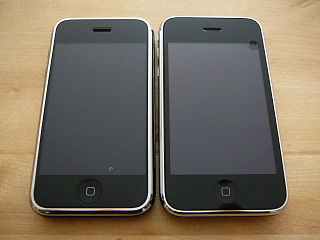 A consumer Apple iPhone class-action antitrust lawsuit (read it below) accuses the Cupertino, California, company of conspiring to monopolize early iPhone purchasers’ voice and data plans by locking them into exclusivity contracts with AT&T Mobility, in violation of federal antitrust law.
A consumer Apple iPhone class-action antitrust lawsuit (read it below) accuses the Cupertino, California, company of conspiring to monopolize early iPhone purchasers’ voice and data plans by locking them into exclusivity contracts with AT&T Mobility, in violation of federal antitrust law.
The proposed class of plaintiffs includes consumers who bought iPhones between October 19, 2008, and February 3, 2011. This corresponds to the period of time when Apple sold three versions of the company’s iPhone: the original, 3G, and 3Gs models.
The plaintiffs are asking for a permanent injunction prohibiting Apple from selling locked iPhones that can be be used only with AT&T Mobility SIM cards, unless consumers get adequate disclosure before their purchase, and an order requiring Apple to give an unlock code to any iPhone customer who wants one.
Plaintiffs Zack Ward and Thomas Buchar also seek an unspecified amount of treble damages against Apple under federal law, in addition to attorneys fees. Apple is the sole defendant in the lawsuit; neither AT&T Mobility, nor any related business units at the telecom was named a party.
The suit alleges that Ward and Buchard each wanted to switch their iPhone plans from AT&T to a different, competing telecom provider. Buchar also contends that by locking iPhone customers’ SIM cards when traveling outside the U.S., he was unable “to switch his iPhone service to a local voice and data service provider while roaming.”
The lawsuit chastises AT&T for unlocking SIM cards on other phones it sells, like Blackberry and Samsung devices, and claims that “[t]here is but one exception: the iPhone,” citing a five-year exclusivity agreement between Apple and AT&T Mobility.
This case has a quite a few hurdles to overcome, however.
First, there is nothing that prevents Apple — or any other company — from entering into an exclusivity contract with another company for its product.
Exclusivity contracts simply do not violate antitrust law. If that were the case, Gatorade stands accused for its post-season exclusivity contract with Major League Baseball. Old Spice would face heavy federal scrutiny for being NASCAR’s “Official Antiperspirant, Deodorant & Bodywash,” and McDonald’s would face legal challenges for being the exclusive Retail Food Services provider (translation: official restaurant) of the Olympic Games.
No federal or state law required Apple to offer consumers voice and data plan choices with other telecoms when the iPhone came to market. Companies enter into exclusivity contracts every day. If you didn’t want to buy an iPhone with an AT&T contract when they were first offered on the market, then you shouldn’t have waited until July 2010.
That is when the Library of Congress announced what is known as the “jailbreaking” exemption under the Digital Millenium Copyright Act (DMCA), allowing mobile phone users to unlock “and break access codes on their devices to switch carriers.”
Unlocking an iPhone from AT&T’s GSM network, or asking Spring or Verizon to do the same from their CDMA network, frees the telecom from giving you any more support for your jailbroken device. Why? Because there is no law requiring a telecom to help a customer who took their business to another carrier after unlocking their phone.
Secondly, neither Apple nor AT&T Mobility forced consumers to buy initial iPhone models. Each early adopter chartered his or her own path to purchase. Nobody forced them to buy Apple’s iPhone either then, or now. For these people — the potential plaintiffs that this class-action lawsuit aims to sign up — being an early iPhone user a whole host of values that are impossible to quantify. Things like personal pleasure, status, and being a member of the Mac faithful…as well as risking potential technical glitches and problems the new phone.
That’s why the new class-action lawsuit over older iPhone models seems very likely to fail.
Do you agree? Judge for yourself by viewing the detailed allegations in the new Apple iPhone antitrust lawsuit below, and share your comments:
Class Action Complaint (Ward, et al. v. Apple, Inc.)
Photo credit: Dan Taylor via Flickr, Wikipedia
